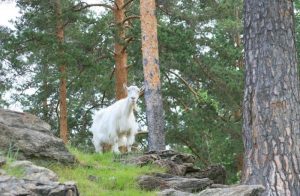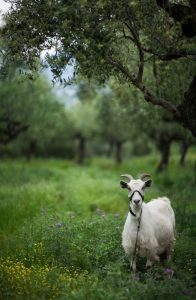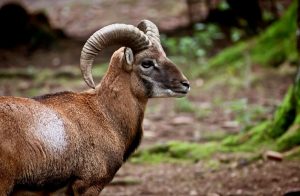Keeping Goats in the Woods: What You Need to Know
Most livestock animals cannot be kept in heavily wooded areas due to the lack of grass for grazing. If you live on a wooded property, you may be wondering if there is any type of livestock you can invest in and keep on your own property. While most large livestock animals are out of the question, it’s time you turn your attention to goats.
Can goats live in the woods? Goats are small livestock that can flourish in a wooded setting. Unlike other livestock animals like horses, cows, and sheep, goats don’t graze but rather browse and eat anything they can find. They will eat leaves, bark, weeds, and any other plant they find in their pen. Goats will utilize a wooded pasture more than any other livestock could.
Before you purchase goats to keep in a wooded area, it’s important to know how goats may affect the forest and what safety precautions you should follow to keep your goats safe. Keep reading to learn more about keeping goats in the woods.
Goats: A Livestock That Can Flourish in Wooded Settings
There aren’t many livestock animals that can flourish in wooded settings. As grazers, most livestock animals require a good supply of grass, which can have more difficulty growing in wooded areas. Animals like horses, sheep, and cows also can’t digest certain types of roughage as well as goats. Goats don’t rely heavily on grass for their food source; instead, they like to eat weeds, shrubs, twigs, tree bark, and leaves. This makes them perfect for being kept in wooded areas or forests.
There are many things to understand and consider before you purchase goats to keep in a wooded area. Take a look at this list:
Goats Will Kill Trees in Their Pen
 As I mentioned above, goats love to eat! They are known to eat just about anything that’s edible…and some things that aren’t! That said, it won’t be a problem to get your goats to eat the vegetation in the wooded area. Their digestive tracts are strong and meant to handle plants that are known to be more difficult to digest.
As I mentioned above, goats love to eat! They are known to eat just about anything that’s edible…and some things that aren’t! That said, it won’t be a problem to get your goats to eat the vegetation in the wooded area. Their digestive tracts are strong and meant to handle plants that are known to be more difficult to digest.
That being said, you shouldn’t expect the trees in your goat pen to survive in the long-run once goats have been introduced to the area. The goats will strip bark from the trees and rub their horns against the trunks. This will make the trees more susceptible to bug infestations and tree disease, which will eventually kill the trees. If you want to protect the trees in your goat pen, you should put up a barrier around the tree trunks.
With all that said, if you have a wooded area you’d like maintained or cleared, goats may be perfect for the job. In fact, many people will purchase goats just to clear land. They’ll eat down shrubs and thorny plants that can otherwise be difficult to remove. If you want to clear your land so you can use it for livestock in the future, I recommend investing in some goats!
There Are Certain Plants Goats Shouldn’t Eat
While goats do love to eat, there are certain plants that can be poisonous to them. In a forest where vegetation is plentiful and varied, it can be difficult to identify all the different types of plants that your goat may come across. Here is a list of the plants you want to watch out for in your goat pen:
- Bracken Fern
- Crotalaria
- Elderberry
- Hemlock
- Honeysuckle
- Jimson Weed
- Nightshade
- Pokeweed
- Sicklepod
- Sumac
- Virginia Creeper
While there are plants that may be poisonous to goats, the effects may not be seen unless excessively digested. It’s said that pine trees are poisonous to goats; however, I’ve seen goats eat away at pine tree trunks and eat the needles from the ground and never have a problem. The health of the goat may determine how they react to certain things they eat, while older and less healthy goats being more affected by “poisonous plants” more than others. That said, it’s important to make yourself aware and determine how cautious you want to be when it comes to regulating your goats’ diets.
Goats Are Escape Artists
Goats are notorious escape artists. Their knack for climbing gives them the ability to find ways out of their enclosure. In a wooded area where there may be rocks and fallen tree trunks laying on the ground, your goats can have even more avenues of escape. As you plan the perimeter of your goat pen, be sure to leave ample distance between grounded objects and your fence to ensure your goats won’t be able to jump their way out.
Did you know that goats can actually climb trees?? If there are branches close enough to the ground, goats can jump to the branches and work their way higher and higher. As I said, they are excellent climbers. With this in mind, you may want to trim back branches that are hanging over fences or enables your goats to get out.
You should also consider burying the fence 12 inches into the ground to ensure there are no holes or spaces your goats or predators could crawl through. As you put up your fence, it’s important to note that leaves can create a dense cover over the forest floor. Don’t align your fencing with the surface of the leaves, but dig down and find where the ground actually is. If you don’t do this, you could leave a 6-inch gap between your fencing and the ground surface.
Your Goats Will Need a Livestock Guardian
 As smaller livestock, goats are susceptible to many different types of predators, especially in a wooded setting. Most predators live in wooded areas and rely on the trees and underbrush for cover and invisibility as they stalk their prey. Here is a list of the most common goat predators:
As smaller livestock, goats are susceptible to many different types of predators, especially in a wooded setting. Most predators live in wooded areas and rely on the trees and underbrush for cover and invisibility as they stalk their prey. Here is a list of the most common goat predators:
- Birds of Prey
- Bobcats
- Coyotes
- Dogs
- Foxes
While good fencing may be enough to deter dogs and coyotes, birds of prey like owls, hawks, and eagles, can swoop down and snatch away goat kids or goats of a miniature breed. Bobcats can jump and climb their way in and foxes can burrow beneath the fence. Seeing how your goats may still be in danger even with a well-fortified pen, it’s important that you get a guardian animal. These are animals that are known to fight of predators and protect the goat population.
The most common guardian animals for goats are dogs and donkeys. Both these animals have a fight instinct that kicks in when predators or chaos arises. While you may consider training your family dog to protect the goats, just know that the dog will then have to stay near the goat pen at night and run the risk of fighting a wild animal. While a dog is easily capable of this, many people aren’t willing to risk their household pet to protect their goats.
A donkey is a great choice of livestock guardian for your goats. Donkeys are low-maintenance and can fit into the goats’ lifestyle. Although they are grazers, they are perfectly happy to eat shrubs and bushes, making them a great choice for a wooded setting. While you may have to maintain their diet with extra hay or grain, they are relatively easy keepers that are made to thrive in arid desert environments. Donkeys are also known to be fighters and will go after any animal that is causing a ruckus.
To learn more about livestock guardian animals, check out my article What Are the Best Livestock Guardian Animals?
Goats Will Improve Pasture Utilization of a Wooded Area
Pasture utilization is a term that basically means how can I get the most out of my land when caring for my livestock? Many farmers will consider this when looking at a property to determine whether the land could sustain livestock adequately. Many people would look at wooded land and determine that livestock wouldn’t be able to utilize the land to its fullest extent, but they haven’t considered goats.
Goats will get the most out of a wooded area compared to any other type of livestock. If you have wooded land that you’ve been thinking about how to make profitable, keeping goats on it is one option. Whether you’re purchasing goats for their meat or milk or you’re planning to start a breeding operation, a wooded setting can sustain the group. This means that the land could be an asset in your goat investment.
This may change the way you look at land. If you’ve been wanting to start a homestead or a small farm, you’ve probably noticed how expensive lush open fields can be for purchase. On the other hand, undeveloped wooded land is much cheaper. This may give you the opportunity to purchase land and raise livestock, while also having the means to clear the land and eventually expand and build.
If you’re looking for livestock that can be useful, profitable, and helpful in maintaining wooded land, I wouldn’t look any further than goats. You can find a wide range of breeds that can all flourish in a forest or wooded setting. If you want to know more about goats, check out the articles below:

